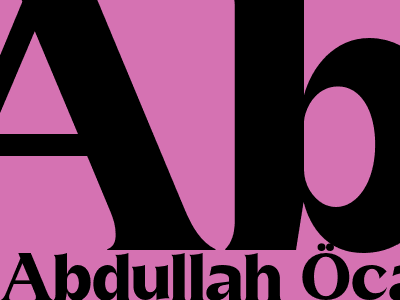
Abdullah Öcalan: A Kurdish Leader's Journey for Peace
Who is Abdullah Öcalan?
Abdullah Öcalan is a Kurdish leader and the founder of the Kurdistan Workers' Party (PKK). Born in 1949 in a Kurdish village in Turkey, Öcalan became a prominent figure in the Kurdish nationalist movement in the 1970s. He founded the PKK in 1978, launching an armed struggle against the Turkish government for Kurdish autonomy.
Öcalan's ideology combines elements of Marxism-Leninism with Kurdish nationalism. He envisions a democratic, confederal Kurdistan, encompassing Kurdish-populated areas in Turkey, Iraq, Syria, and Iran. Öcalan's writings and speeches have significantly influenced the Kurdish movement and have made him a respected figure among many Kurds.
The Kurdish Struggle in Turkey
The Kurds, an ethnic minority of over 30 million people, have faced decades of oppression and discrimination in Turkey. Denied basic rights and cultural recognition, the Kurdish people have long sought autonomy or independence. The Turkish government has responded to Kurdish aspirations with military force, leading to a long-running conflict that has claimed thousands of lives.
The PKK, under Öcalan's leadership, has been at the forefront of the Kurdish resistance in Turkey. The group's armed struggle has drawn international attention and has been condemned by the Turkish government as terrorism. However, the PKK has also been involved in peace negotiations with the Turkish government, and Öcalan has played a crucial role in promoting dialogue and reconciliation.
Öcalan's Capture and Imprisonment
In 1999, Öcalan was captured by Turkish intelligence in Kenya and sentenced to life imprisonment on charges of treason and terrorism. His imprisonment has become a rallying point for Kurdish activists and has drawn criticism from human rights organizations. Despite his confinement, Öcalan continues to be a symbol of Kurdish resistance and a voice for Kurdish aspirations.
In recent years, Öcalan has been involved in peace talks with the Turkish government from his prison cell. He has called for a ceasefire and a negotiated settlement to the Kurdish conflict. However, peace efforts have been hampered by ongoing violence and political obstacles. The Kurdish issue remains a complex and challenging one, with no easy solutions.
Cologne's Role in the Kurdish Diaspora
Cologne, Germany, has become a significant center for the Kurdish diaspora. With a large Kurdish population, Cologne has provided a supportive environment for Kurdish cultural and political activities. The city has hosted numerous Kurdish cultural events, conferences, and demonstrations.
Cologne's Kurdish community has also played a vital role in supporting Öcalan and the PKK. The city has been a hub for Kurdish activists and has provided a platform for Kurdish voices to be heard internationally. Cologne's active Kurdish diaspora has contributed to raising awareness of the Kurdish cause and has helped to build international solidarity.
Conclusion
Abdullah Öcalan is a complex and controversial figure who has played a central role in the Kurdish struggle for autonomy and recognition. His life and work have shaped the course of Kurdish history and continue to inspire Kurdish aspirations for peace and self-determination.